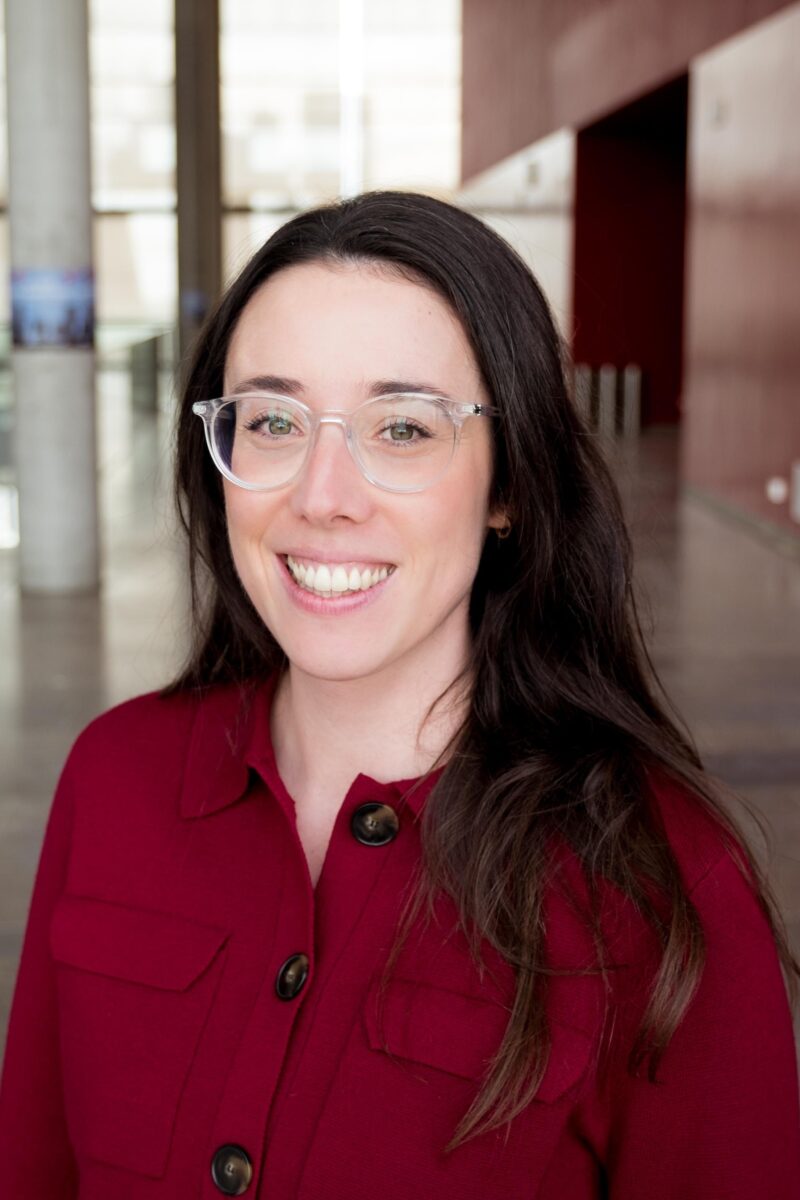j.schubert@em.uni-frankfurt.de
Short Vita
Julia Schubert is a sociologist working in the field of science studies. Her research explores the relation between science and politics, as well as notions of expertise. She is particularly interested in how scientific efforts to understand environmental issues are intertwined with political efforts to govern such issues. Empirically, she has worked on the history of climate science and policy. In her first book, Julia unpacks how the idea to deliberately engineer the climate gained traction in U.S. climate policy (Mattering Press 2021, matteringpress.org).

Julia holds a PhD in Sociology from the University of Bonn and an M.A. in Sociology from the University of Heidelberg. From 2016–2017, Julia was a Fulbright Scholar at the University of Colorado at Boulder. Currently, Julia is a member of Brown University’s Climate Social Science Network (CSSN), and board member of the Science and Technology Studies Section in the German Sociological Association (DGS). In 2022, she was appointed to the UNESCO World Commission on the Ethics of Scientific Knowledge and Technology (COMEST).
More information on Julia’s CV, research, teaching, and lectures.
Project Description
As a postdoctoral researcher with the Fixing Futures RTG, Julia studies the emerging field of extreme-event attribution. Her project explores how this field of attribution science works as a ‘technology of anticipation’, that is, how it conceptualizes and engages with the open and inevitable future of a changing climate. To address this question, the project focuses on the ‘epistemic machinery’ (Knorr-Cetina 1999) of this emerging research field. It is concerned with the methods, models, and protocols, the computers, programs, and organizations that the science of attribution has evolved around. Drawing on the analysis of scientific texts, as well as archival and field research, the project seeks to situate this ‘epistemic machinery’ within the broader trajectory of the climate science field and its relation to the state.
Publications
Monograph
Schubert, J. (2021). Engineering the Climate: Science, Politics, and Visions of control. Manchester: Mattering Press.
Articles (Peer Reviewed)
Moser, E./ Schubert, J. (2025). Making Expert Bodies: A Sociological Analysis of the Formation of Regulatory Agencies in US Politics. Minerva, 1–23. https://doi.org/10.1007/s11024-025-09593-z
Schubert, J. (2022). Science-State Alliances and Climate Engineering: A “Longue-Durée“ Picture. WIREs Climate Change. https://doi.org/10.1002/wcc.801
Schubert, J. (2021). Die politische Wirkmacht wissenschaftlicher Expertise. Natürliche Analogien und theoretische Experimente in U.S.-amerikanischer Geoengineering-Politik. Dritte Natur. Berlin: Matthes und Seitz.
Hamann, J./ Kaldewey, D./ Schubert, J. (2019). Die gesellschaftliche Relevanz von Forschung. Drei Modelle ihrer Bewertbarkeit. Wissenschaftsmanagement 2(2019), 133-137. [pdf]
Schubert, J. (2016). The Organizational Interface of Science and Politics. Towards a Conceptual Framework. Der moderne Staat – Zeitschrift für Public Policy, Recht und Management, 8(2), 51–64.
Hoelscher, M./ Schubert, J. (2015). Potential and Problems of Existing Creativity and Innovation Indices, Creativity Research Journal, 27(1), 1–15.
Edited special issues and volumes
Domes, L./ Gonzalez Monserrate, S./ Neddermeyer, I./ Pickartz, T./ Schubert, J. (eds.). (2025). Fixing Futures: Planetare Zukünfte zwischen Spekulation und Kontrolle. Neofelis.
Hölscher, M./ Schubert, J. (eds.) (2022). Universities between Inter- and Re-Nationalization: A Review Symposium. Special Issue in Global Perspectives (2022) 3(1). University of California Press.#
Chapters
Schubert, J. / Quante, M. (2024): Last Exit Climate Engineering? Zur Diskussion um das Strahlungsmanagement bei drohender Überschreitung der Klimaziele, in: Lozán, J. L., Graßl, H., Kasang, D., Quante, M., & Sillmann, J. (Eds.). (2024). Warnsignal Klima: Herausforderung Wetterextreme – Ursachen, Auswirkungen & Handlungsoptionen. Wissenschaftliche Auswertungen.
Schubert, J. (2024). The Politics of Climate Engineering Research. In Z. Baker, T. Law, M. Vardy, S. Zehr (ed.), Climate, Science and Society: A Primer. London: Routledge. https://doi.org/10.4324/9781003409748
Schubert, J. (2023). Climate Engineering. Sozialwissenschaftliche Perspektiven auf eine Emerging Technology. In M. Sonnberger, A. Bleicher, M. Groß, Handbuch für Umweltsoziologie (pp. 1–14). Dodrecht: Springer. https://doi.org/10.1007/978-3-658-37222-4_35-1
Schubert, J. (2023). Soziologie der Expertise. In D. Kaldewey (ed.), Wissenschaftsforschung: Grundbegriffe, Forschungsfelder und Forschungsfragen. Berlin: de Gruyter.
Hamann, J./ Schubert, J. (2023). Nützliche Forschung: Die Bewertung und Vermessung der gesellschaftlichen Relevanz von Wissenschaft. In D. Kaldewey (ed.), Wissenschaftsforschung: Grundbegriffe, Forschungsfelder und Forschungsfragen. Berlin: de Gruyter.
Schubert, J. (2023). Vermessung, Modellierung, Beherrschung des Klimas? Numerische Expertise in US-amerikanischer Klimapolitik. In M.J. Prutsch (ed.), Wissenschaft, Zahlen und Politik. Palgrave Macmillan: Cham. https://doi.org/10.1007/978-3-031-23073-8_9 [translation of Schubert (2019)]
Hölscher, M./ Schubert, J. (2022). Universities between Inter- and Re-Nationalization: An Introduction. Global Perspectives (2022) 3(1). University of California Press. https://doi.org/10.1525/gp.2022.56926
Kaldewey, D./ Russ, D./ Schubert, J. (2020). The Politics of Technoscience: From National Visions to Global Problems. In: Maasen, Sabine/ Sascha Dickel (Eds.): TechnoScienceSociety. Sociology of the Sciences Yearbook.
Schubert, J. (2019). Measuring, Modeling, Controlling the Climate? Numerical Expertise in U.S. Geoengineering Politics. In Prutsch, Markus (Ed.): Working Numbers. Science and Contemporary Politics. Basingstoke: Palgrave Macmillan.
Hamann, J. / Kaldewey, K. / Schubert, J. (2019). Ist gesellschaftliche Relevanz von Forschung bewertbar, und wenn ja, wie? Austrian Academy of Sciences, URL: www.oeaw.ac.at/preisfrage.
Russ, D./ Schubert, J. (2016). Verwissenschaftlichung der Politik? Eine Analyse massenmedialer Darstellungskontexte politischen Entscheidens (1946–2011). In: Lemke, Matthias/ Gregor Wiedemann (Eds.): Text Mining in den Sozialwissenschaften. Grundlagen und Anwendungen zwischen qualitativer und quantitativer Diskursanalyse. Wiesbaden: VS Verlag.
Kaldewey, D./ Russ, D./ Schubert, J. (2015). Following the Problems. Das Programm der Nachwuchsforschergruppe “Entdeckung, Erforschung und Bearbeitung gesellschaftlicher Großprobleme.“ FIW Working Paper, No 2.
Review
Schubert (2024). Book review: Mike Hulme ‘Climate Change Isn’t Everything: Liberating Climate Politics From Alarmism’. Public Understanding of Science, 33(6), 813–814. https://doi.org/10.1177/09636625241235991
Policy Report
UNESCO (2025). The Ethics of Climate Engineering. Reports of the COMEST series. UNESCO. https://doi.org/10.54678/XCCJ9540
